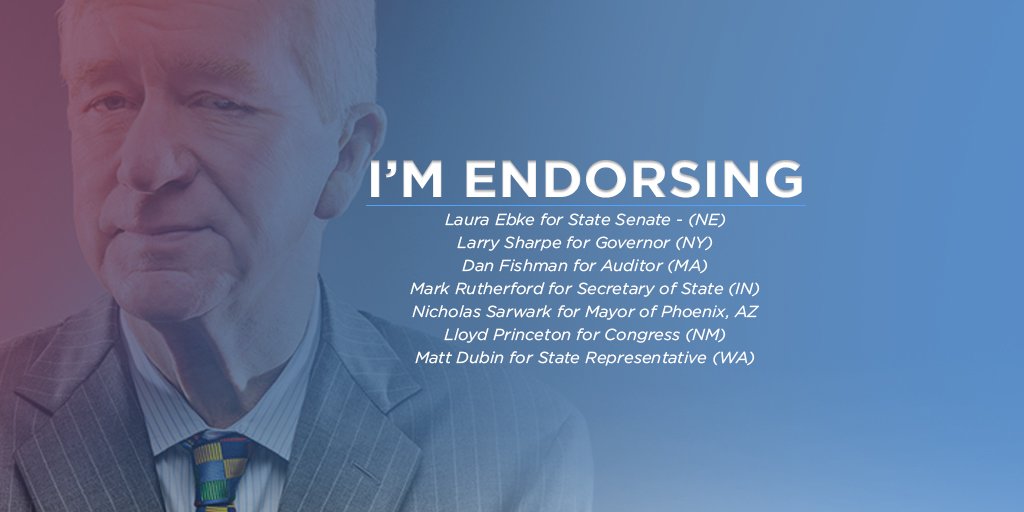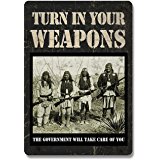 If you had asked most members of the Libertarian Party on election night 2016 whether vice presidential candidate Bill Weld would be central to the L.P.’s efforts in 2020, you may well have been held in violation of the Non-Aggression Principle.
If you had asked most members of the Libertarian Party on election night 2016 whether vice presidential candidate Bill Weld would be central to the L.P.’s efforts in 2020, you may well have been held in violation of the Non-Aggression Principle.
The former two-term governor of Massachusetts had just wrapped up a tumultuous first six months as member of the party, from a hotly contested V.P. nomination to unprecedented media penetration to persistent speculation that he might drop out, all culminating with an unforgivable-for-some six-word sentence on The Rachel Maddow Show one week before the election: “I’m here vouching for Mrs. Clinton.” Even those who were charitable toward Weld’s late-breaking behavior—and there weren’t many—reckoned that he’d parlay his successful/disappointing Libertarian half-year into some new centristy John Kasich/John Hickenlooper action. That is, if the well-heeled lawyer bothered with politics at all.
They were wrong. After announcing last November that “I’m going to stay L.P.” and declaring the party “perfectly positioned to fill what’s a growing need in the country,” Weld is now openly laying the groundwork for a 2020 presidential campaign. The only question is whether he’ll be the one running.
“I really have been doing a lot reading and thinking about what it means to be the Libertarian Party, and what possible achievements and upsides the Libertarian Party could” accomplish, Weld told me in an interview at the California state L.P. convention on Sunday. (You can watch that interview in full at the bottom of this post.) So is he running? “I take this stuff seriously,” he told me. “But I’m sincere when I say that I’m not talking about who is going to do the Libertarian race in 2020; I’m just here to say that I think that’s a race that has some real potential to go the distance, and the sooner we all wrap our minds around that, the better.”
Over the past few months, Weld has been schlepping his favorite brown coat from Houston to New York to Long Beach for state conventions, delivering his rap about how the party can best grow from here (“The number one thing we need to do by November 2020 is to elect a Libertarian president of the United States”) and sketching out tantalizing visions of “$50 million or $100 million in the bank at the beginning of the campaign.”
 Weld is also issuing strategic endorsements to some of the party’s biggest names—Republican-turned-Libertarian Nebraska state Sen. Laura Ebke (facing her first re-election with an “L” by her name starting with a May 15 jungle primary), Massachusetts auditor candidate Dan Fishman (said to have a plausible shot if some local scandals break right), Phoenix mayoral hopeful Nicholas Sarwark (the party’s national chairman), New York gubernatorial challenger and ubiquitous state-party-convention presence Larry Sharpe, and others. More rounds of endorsements are expected in the near future.
Weld is also issuing strategic endorsements to some of the party’s biggest names—Republican-turned-Libertarian Nebraska state Sen. Laura Ebke (facing her first re-election with an “L” by her name starting with a May 15 jungle primary), Massachusetts auditor candidate Dan Fishman (said to have a plausible shot if some local scandals break right), Phoenix mayoral hopeful Nicholas Sarwark (the party’s national chairman), New York gubernatorial challenger and ubiquitous state-party-convention presence Larry Sharpe, and others. More rounds of endorsements are expected in the near future.
Other party-building activities include filing lawsuits to make the allocation of electoral votes proportional instead of winner-take-all in four states (which, Weld says, would have resulted in the L.P. receiving 17 electoral votes in 2016); recruiting potential candidates, donors, and (quietly) vice-presidential possibilities; and starting the obligatory 501(c)(4) advocacy group, Freedom for America.
“I’m looking also at the national level for people who could be helpful to the Libertarian Party, and there are two types,” he told me. “One is people who are office-holders or have been office-holders in the R and the D parties, but who really are Libertarians underneath it all. Another is billionaires who could fund the operation—because we can’t afford to be caught short, as Gary [Johnson] and I were last time.”
Weld’s access to money, media, and prestige stands in stark contrast to his potential presidential competitors, though that’s in part because there really aren’t any so far, aside from anarcho-libertarian activist and trouble-magnet Adam Kokesh. The Adam vs. the Man impresario has been dogging Weld on the L.P. circuit, challenging him to debates, ambushing him on camera with questions like “How much did Hillary Clinton pay you off?” and accusing him of being a “liar and backstabber.” Weld has stayed mostly affable amid the flak.
“I think both Adam and I think that it doesn’t have to be us to carry the flag across the finish line,” he volunteered during our interview, with Kokesh in the room.
Skepticism toward the Boston Brahmin runs much deeper than the party’s anarchist and radical blocs—I counted six main reasons for the reticence before the voting at the 2016 national convention. What’s interesting is that Weld has either copped to or altered his positions on at least four of them. “I’ve learned a lot since 2016,” he said at the outset of our conversation. “I mean, I do blush to think of some of my early steps.”
For example: guns. One of Weld’s favorite stories these days is of going to Deadwood, South Dakota, at the tail end of the 2016 campaign, and seeing a poster of the Indian warrior Geronimo holding out a rifle, with the caption “Turn in your weapons: The government will protect you.” Weld’s punchline: “Didn’t work out so well for Geronimo.”
 “I can remember saying at that [2016] convention, ‘Oh yeah, no, I’m really a Second Amendment guy, because I’m a hunter, and I own shotguns and rifles,'” he recalled. “And that’s not really the point.” In his speech to delegates in Long Beach, Weld was considerably more declarative on the issue than at any time during 2016. “We’ve got 300 million rifles out there—and, need I add, lawfully acquired rifles. I think you get it: The day is not far distant that we’re going to have a final consensus that those guns are not going anywhere, and we just can’t have ambiguity about that.”
“I can remember saying at that [2016] convention, ‘Oh yeah, no, I’m really a Second Amendment guy, because I’m a hunter, and I own shotguns and rifles,'” he recalled. “And that’s not really the point.” In his speech to delegates in Long Beach, Weld was considerably more declarative on the issue than at any time during 2016. “We’ve got 300 million rifles out there—and, need I add, lawfully acquired rifles. I think you get it: The day is not far distant that we’re going to have a final consensus that those guns are not going anywhere, and we just can’t have ambiguity about that.”
Weld says he has also changed on foreign policy, telling me last November: “If I had to talk about an issue where the campaign changed my thinking, it probably would be interventionism.” And after having been a prosecutor, and still looking visibly uncomfortable when talking too much about drugs in 2016, Weld is now happy to brag about being on the same marijuana advocacy board as John Boehner.
“I can almost feel myself sinking more deeply into the Libertarian Party,” he said. “I feel myself broadening and, as I say, even deepening politically.”
Will the party welcome Weld back into the fold? Are activists ready to put forth a fourth consecutive ex-Republican politician as presidential nominee? It’s certainly not hard to encounter sentiments like this:
Bill Weld is not a libertarian. Not even close. Not even a fellow-traveler. Just a phony baloney, talking-points-driven, mendacious politician like any other.
Ask him a real question about the NAP or any libertarian issue. He fails spectacularly. Get him and the likes OUT-asap
— Corey Vollinger (@corey_vollinger) May 2, 2018
At the same time, if a growing party is going to continue to grow, and to position itself as the beneficiary of the Democratic and Republican parties’ ongoing nervous breakdowns, it is going to need to absorb major-party defectors with less libertarian cred than Bill Weld. In his speech at the California convention, Sarwark, who is up for re-election as party chair this summer in New Orleans, encouraged his fellow Libertarians to put down their internecine squabbling and recognize the Weld/Kokesh divide (my framing, not his) as a “good cop, bad cop” scenario in which everyone has his or her role.
“Martin Luther King is not as effective without Malcolm X,” Sarwark contended. “Politicians who put on suits and get up on debate stages are not as effective without people standing in the streets with signs threatening to strike or picket or do direct action. Both are important in order to move public policy forward and get to a world set free in our lifetime. We need people on the outside agitating to move the Overton Window of acceptable discourse to where it looks libertarianish, then we need somebody—like Governor Weld, just for an example, because I can see him from here—running up in a suit, inside the Overton Window, going: ‘Oh my gosh, look at all those crazy people out there! They really want freedom. You know I’m more reasonable. You can just elect me!’
“It’s a set-up!” Sarwark continued. “It’s a lay-up! It’s the bounce-pass to the guy who goes and does the dunk. It’s not an existential battle for which one of you has to die or get kicked out the party first. And for too long we’ve made it that.” If Libertarians get behind a Weld 2020 campaign, it will be through argumentation like that.
The Libertarian Party has a truly valuable commodity: likely ballot access in all 50 states, at a time when the major parties are both abandoning even rhetorical support for balanced budgets, free trade, civil liberties, non-interventionism, and a host of other key issues. By planting a tentative flag in early 2018, Weld is establishing a floor of mainstream possibility—and signaling to any would-be outsiders eyeing the prize that libertarian-leaners are going to need to tack more Libertarian if they want to woo the activists who have made this moment possible.
My full interview with Weld:
from Hit & Run https://ift.tt/2FBQ8VW
via IFTTT